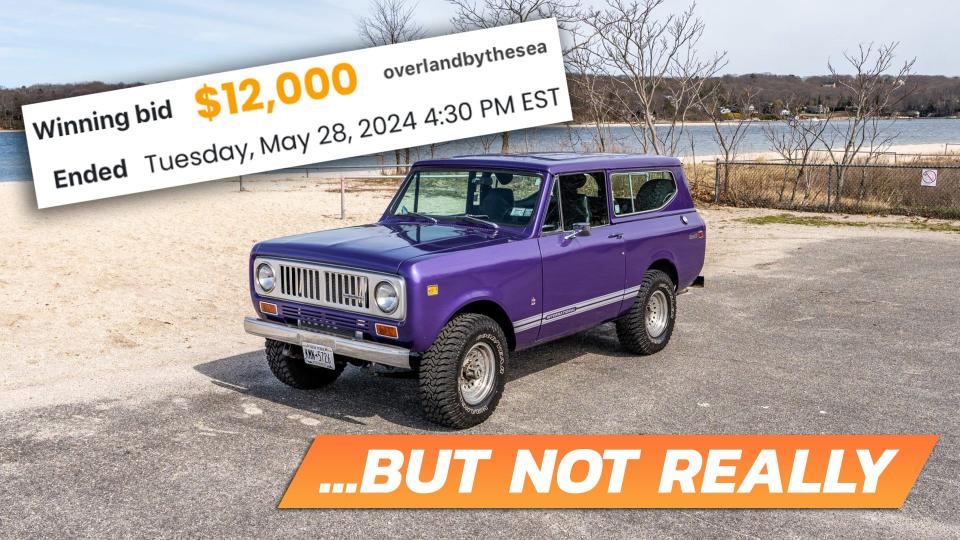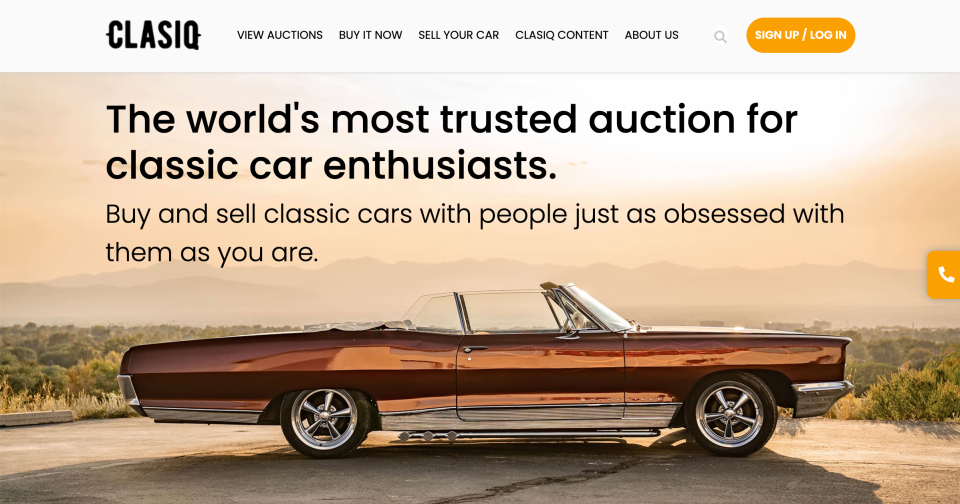This 1974 IH Scout Was Pulled From 'No-Reserve' Auction Over Low Winning Bid

Online car auction sites are great... until they're not. For most, they're go-to window shopping destinations when you want to gawk at the market's most interesting or immaculate rides. For customers and clients, though, they facilitate big-money transactions and stakes are high. The protections in place for buyers and sellers aren't always enough, and if a situation turns sour on one platform, there's little stopping someone from trying the same shenanigans elsewhere on the web.
Chris Picconi says he's experiencing this firsthand after winning a no-reserve Clasiq auction on May 28. Or, rather, he thought he won a no-reserve auction for a 1974 IH Scout, only to be told there was a problem with the listing. Although Picconi placed the highest bid of $12,000, Clasiq says there should have been a reserve set for $32,500. As a result of the claimed technical error, the site nullified the sale.





It was at this point that Picconi contacted me about his experience. He included screenshots of the Clasiq listing that identify him as the winner of the no-reserve auction. He also forwarded his correspondence with Clasiq's senior manager of auction sales and client relations as well as its CEO. They apologized for the mix-up, told Picconi the seller would let his Scout go for $31,500 in an attempt to salvage the deal, then pointed to their terms and conditions when Picconi involved his lawyer. At that moment, it seemed like a sad case of Picconi missing out on another truck for his collection. That's definitely a frustrating scenario, but the auction house's fine print effectively ended the story and he got his money back.
However, it got interesting on Sunday, June 9, as the very same IH Scout was listed on Bring a Trailer with no reserve. Not only that, but Picconi says his comments on the new listing are being "promptly removed" by Bring a Trailer. He's now gone as far as emailing the company's CEO about "the seller's past indiscretions."
Adding another layer to the story, the same seller listed this exact Scout on Bring a Trailer in April 2022 but it failed to meet reserve with a high bid of $29,000.



Picconi is the founder of Classic 4x4, a marketing and advisory company for collectors in the vintage off-road space. He buys and sells vehicles like this Scout regularly—for a living, even. However, he says the IH would have landed in his personal collection. He chose not to pay the admittedly sizable difference between his high bid and the adjusted $31,500 asking price, and since Clasiq's terms and conditions appear to absolve it from ensuring the sale takes place, that was seemingly the end.
Now Picconi insists the ball is in Bring a Trailer's court. At the time of publishing, he hasn't received a response from the company or any of its representatives. He goes as far as saying this is "possible fraud being perpetuated through seller and marketplace collusion."
From where we're sitting, it certainly seems curious.
In any case, the IH Scout's current high bid on Bring a Trailer is $12,500 with six days to go. That's $500 more than Picconi's top bid on Clasiq, so the seller is already closer to his previous asking price.



It's a sticky situation that begs the question: When is a no-reserve auction actually that? What's stopping sellers or online marketplaces from writing off unsatisfactory results as technical errors so they can try again with no obligations? On the one hand, it's maddening for Picconi to think he scored a deal on a vintage 4x4, only for it to fall through over reasons outside his control. On the other, his money was returned. It's objectively unfair regardless.
Picconi concludes by saying scenarios like this compromise trust while putting buyers specifically at risk.
"Online automotive marketplaces now dominate the market share for collector vehicle transactions. Most online automotive marketplaces operate with balance, integrity, and trust. Given they are mostly unregulated and self-regulated, many of these businesses that facilitate millions of dollars of collector vehicle transactions a day are rife with potential fraud, collusion, straw bidding, and compromised integrity at the expense of buyers/consumers."
"These marketplaces are essential to creating liquidity and transparency in our enthusiast community," Picconi continued, "but with good there is also bad."
If this becomes the status quo, consumers could repeatedly get stuck with the short end of the stick. But unless it's written into regulations or the companies' terms and conditions, it's unlikely to stop. Either way, auction sites aren't going anywhere, so do your due diligence before dropping tens or even hundreds of thousands of dollars on that collector's item.
Got a tip or question for the author? Contact them directly: caleb@thedrive.com

 Yahoo Autos
Yahoo Autos 